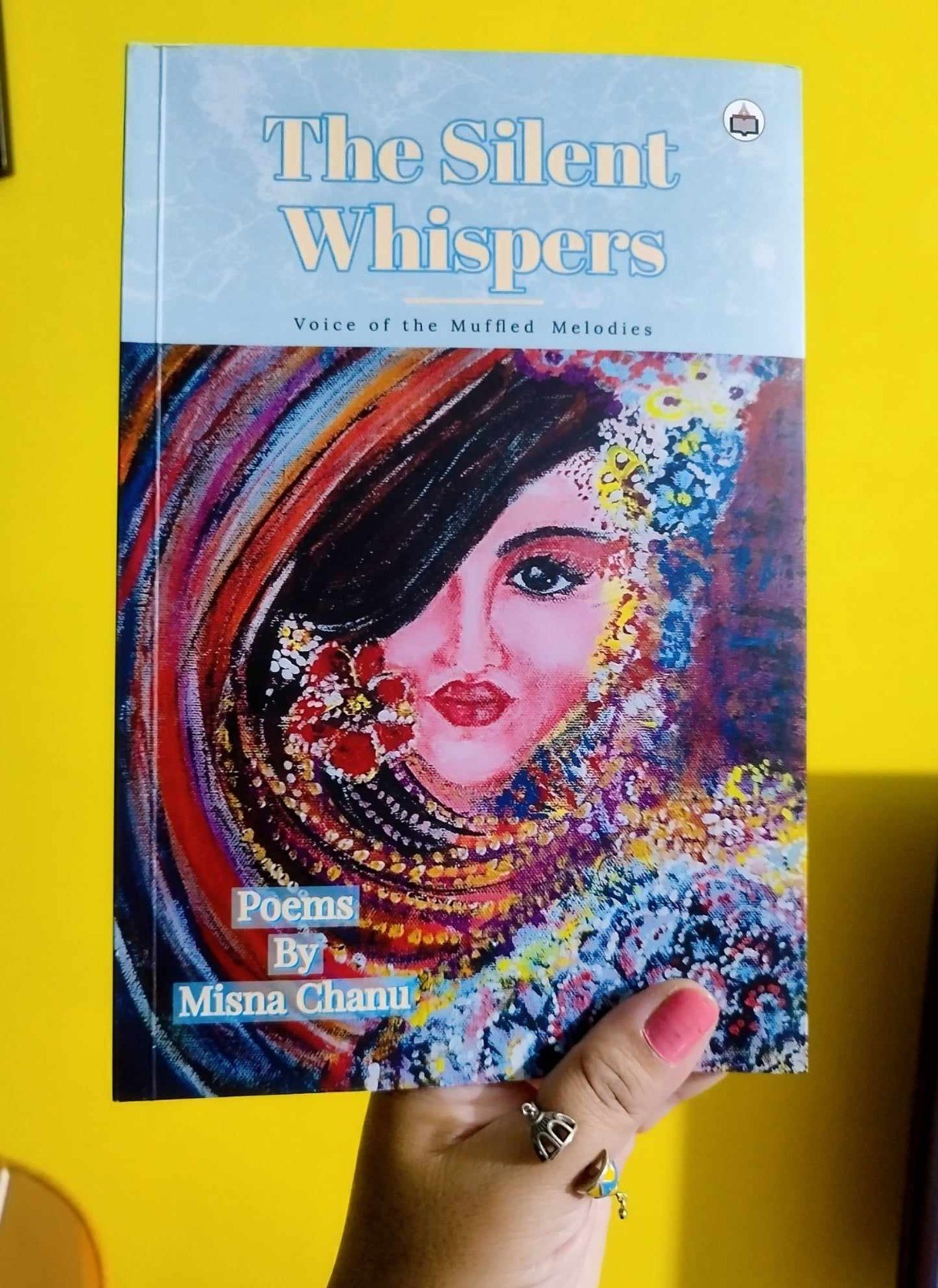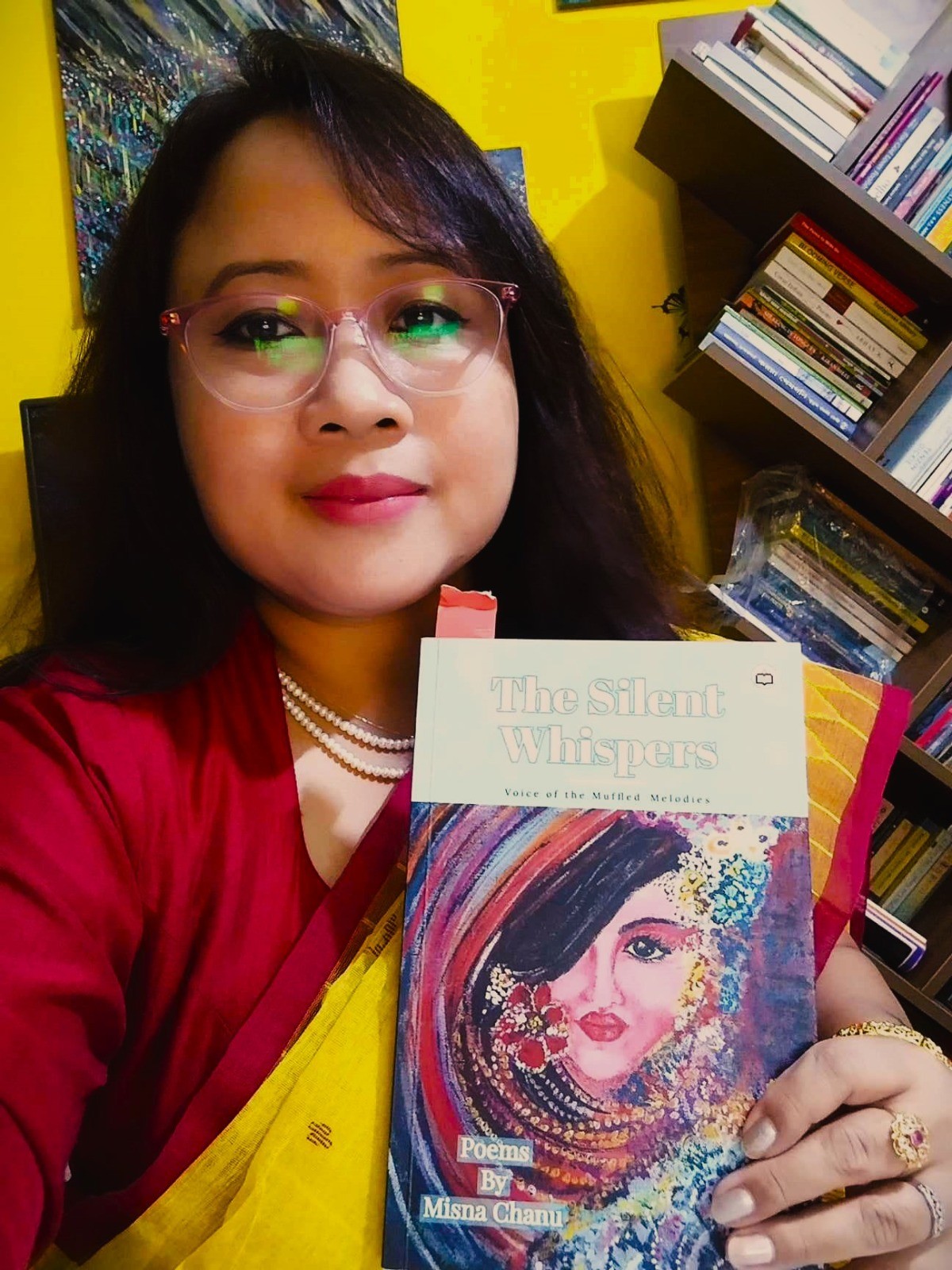According to poetess Misna Chanu, India, the author of “The Silent Whispers”; “Poetry is not just lines of beautiful words on a piece of paper; but it’s a part of moments we lived and living memories we created and still carrying within! Poetry is a part of imaginations and realities, a part of dreams and desires, a part of hope and despair, a part of bitter and sweet realities of life. Then, poetry is some pieces of heart, some drops of tears, some moments of laughter, some moments of failure
Some moments of joy and unending moments of heart’s yearning and longing too! And most of all, poetry is the portrait of unbreakable silence on the canvas of soul!”

For many reasons, I consider this poem is the key to understand the new collection of Misna Chanu, “The Silent Whispers”, First Published in 2022 by Authorspress, New Delhi, India (124 Pages). In her Preface, the author has a confession; She exists only in two places wholly. In her words and the silence between her words!, and “The Silent Whispers” is not only her whisper but the whispers of many souls of this universe whose songs remain only as whisper. She also represents “The Silent Whispers” as the unheard and unsung songs of one’s heart and voices of the world those are neglected or sometimes muted for one or many reasons. Then, “The Silent Whispers” is also the melody of all those unsung songs, somewhere diffused between the layers of time and space with none to listen to. “The Silent Whispers” is then, the voice of all the muffled melodies of the world.
The idea of this book “The Silent Whispers” was even knitted deep down in my heart before my mind could understand what it was all about! Maybe that’s the reason why she opened a Facebook page named “The Silent Whispers” around 10 years ago to share her thoughts and verses long before her mind could think of publishing a poetry book named “The Silent Whispers”.

Since a very young age, Misna Chanu has been writing poems and short stories but she didn’t really think of becoming a published author one day. She love Poetry and art of all kinds. That was the only thing she was sure of. When she was fifteen years old, her first poetry entitled “Punshi” (Life) in Manipuri (her mother tongue) was published in a magazine called “Yening” in Assam (India). Her grandmother Padmabati Kshatriyani was the first person who introduced her with art and literature. When she was a little girl, she used to read her poems of the great Indian poet and Nobel Laureate Rabindranath Tagore. His poems ignited a spark inside her heart to write poems. Then, she read poems of a Manipuri Poet and the Founder of “Apokpa Maroop” (Apokpa religion) Lainingahal Naoriya Phulo. His poems fanned the spark within her heart and helped that spark becoming a flame. When she was in middle school, she came across the poems of Manipuri poet Dr. Lamabam Kamal. His poetry “Bishwaprem” was the poem that ignited the spark within my heart for a world of Universal love and unconditional love. His whispers touched her soul and since then, her heart has been burning with the longing of a world of unity, unconditional love, peace and harmony. She writes:
I do not dream of a paradise
But I dream of a world
Where no garden is devoid of flowers
And no heart is devoid of love!

In his foreword, Meenakshi Mohan, Ed.D., academic, writer, poet, artist, critic, editor and inquiry in Education, National Louis University, Chicago, USA, wrote that this following poem summarizes the book's theme and Misna's seventy-five verses:
A little piece of heaven
And a little piece of paradise
I bring between
My silence and my song;
When the ode sings itself
With the known lyrics
And an unknown euphoria,
And fragrances are sweeter
Than before,
With a nostalgic pain
And pleasure of their own,
Here, I remember you!
I remember you
Perhaps, as a symphony
Of souls!
Perhaps as a hymn
Of love!
Perhaps, as a sacred sanctuary
Of silence!
Meenakshi Mohan adds that Misna Chanu's poems are written in simple, free verses yet are profound and descriptive. They flow like stories, giving words to her emotions and vicariously experiencing her feelings for others. Her verses are short with vivid imagery. Even the titles of her poems are like colors on a canvas, e.g., Pearls Sleep in Silence, I Don't Want Another Son of God to be Crucified, Last Dance, Children of the Lost World, and I Will Paint You in my Poem. Her poems orbit around human emotions. There is a tinge of sadness, yet hope and expectations add a dynamic flow to her verses. Her verses are like streams that flow steadily with their calm ripples spreading melodies despite facing many promontories of "life." Misna's poems remind him of these lines by Maya Angelou:
“Yet, today I call you to my riverside …
Come clad in peace, and I will sing the songs
The Creator gave to me when I
And the tree and stone were one.”
I conclude this short review with two examples of Misna's poems:
My Verses Are Stained
My verses are stained with
The silent cries
Of the unborn poems
Inside the womb of feelings,
Aborted by cruelty of time,
Before the birth of a dream!
My verses are stained with
The unseen tears of love,
That remain unnoticed
From the heart
For which my heart cries!
My verses are stained with
The invincible moments
Of melancholia
When solitude losses
Its leaves of charm for being solitary,
Like an Autumn tree,
But with no hope
For the arrival of Spring!
My verses are stained with
The memories of despair,
Denying to fade away with time
And the tales of the betrayals
Being told again and again in life!
My verses are stained with
Everything I have lost in my life
And all that, no longer,
I can claim as mine!
The Child Within
Let's explore
The child within us
Who smiles without reason!
Let's explore
The child within us
Who laughs out loud without hesitation!
Let's explore
The child within us
Who doesn't know the boundaries
Of the countries and the continents!
Let's explore
The child within us
Who doesn't know the walls
Between religions and races!
Let's explore
The child within us
Who loves without conditions!
Let's explore
The child within us
Who enjoys the little things of life
Without rational reasons!
Let's explore
The child within us
To live and to cherish life
More and more!

Comments